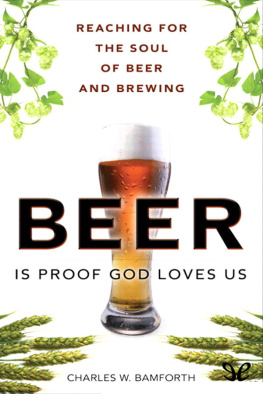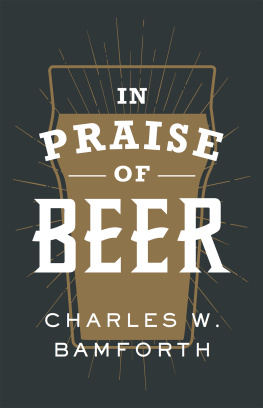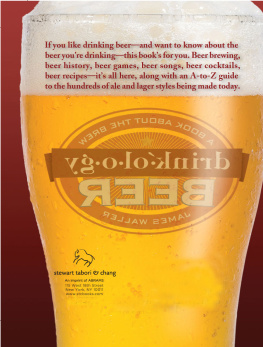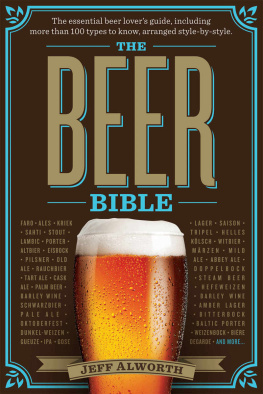Charles W. Bamforth - Beer is proof God loves us
Here you can read online Charles W. Bamforth - Beer is proof God loves us full text of the book (entire story) in english for free. Download pdf and epub, get meaning, cover and reviews about this ebook. year: 2011, publisher: ePubLibre, genre: Romance novel. Description of the work, (preface) as well as reviews are available. Best literature library LitArk.com created for fans of good reading and offers a wide selection of genres:
Romance novel
Science fiction
Adventure
Detective
Science
History
Home and family
Prose
Art
Politics
Computer
Non-fiction
Religion
Business
Children
Humor
Choose a favorite category and find really read worthwhile books. Enjoy immersion in the world of imagination, feel the emotions of the characters or learn something new for yourself, make an fascinating discovery.
- Book:Beer is proof God loves us
- Author:
- Publisher:ePubLibre
- Genre:
- Year:2011
- Rating:3 / 5
- Favourites:Add to favourites
- Your mark:
- 60
- 1
- 2
- 3
- 4
- 5
Beer is proof God loves us: summary, description and annotation
We offer to read an annotation, description, summary or preface (depends on what the author of the book "Beer is proof God loves us" wrote himself). If you haven't found the necessary information about the book — write in the comments, we will try to find it.
Beer is proof God loves us — read online for free the complete book (whole text) full work
Below is the text of the book, divided by pages. System saving the place of the last page read, allows you to conveniently read the book "Beer is proof God loves us" online for free, without having to search again every time where you left off. Put a bookmark, and you can go to the page where you finished reading at any time.
Font size:
Interval:
Bookmark:
I was on the legendary Fifth Floor of the time-honored St. Louis Brewery of Anheuser-Busch. A dozen or more glasses of Budweiser were before me. Around the table was the cream of the company's corporate brewing staff and me, the newly incumbent Anheuser-Busch Endowed Professor of Malting and Brewing Sciences at the University of California, Davis.
Doug Muhleman, a wonderful Aggie alum and god of matters technical within the august brewing company, invited comments on the beers before us. One by one, the folks around the table proffered their opinion on the samples, which represented the venerable Bud as brewed in all of the locations worldwide where it was produced. In due sequence, my turn arrived. I gulped, thought about my new job title, and said well, they are all great, all very similar, but this one I find to be a bit sulfury as I gestured to the lemon-colored liquid in one of the glasses. I needed to demonstrate that I was one smart dude.
A hush fell over the surroundings. I felt all eyes on me. And then I heard someone tapping into his cell phone, as the journey of investigation started into what it was that the esteemed professor had discovered in the brew.
I had visions of airline tickets being purchased, jobs being lost, brewers consigned to the Siberia of the company wherever that was (Newark perhaps?). And in an instant I knew that it would be the last time I would pass critical comment in that room. For on the one occasion that I had, with a remark founded on a desire to be perceived as being knowledgeable rather than any genuine ability to find fault with the remarkably consistent product that is Budweiser, the potential impact was too immense to even think about.
There are many people in the United States and beyond who decry Bud. They would be wrong to. For here is a product that, for as long as it has been brewed, which is for rather more than 130 years, has been the ultimate in quality control excellence.
Let there be no confusion here. That a product is gently nuanced in flavor does not make it somehow inferior. The reality is that it is substantially more challenging to consistently make a product of more subtle tone, there being far less opportunity to disguise inconsistency and deterioration than can be the case in a more intensely flavored beverage. And to make such an unswerving beer in numerous locations worldwide, with none but the acutely attuned brewmasters resident in the corporation able to tell one brewery's output apart from another, is a truly astonishing achievement.
* * *
Doyen of the company from 1975 was August A. Busch III. I recall a former student of mine, newly ensconced at the Fairfield brewery in Northern California, telling me of his first encounter with Mr. Busch. It was awful, he said. Mr. Busch breezed in and spent the whole time firing out questions, challenging and finding fault with pretty much everything that we were doing. Being really critical. I smiled, replying, You know, that is really a very high class problem. To have a man whose name is on the label showing such interest, commitment, and determination for the best is a wonderful thing. This is someone who will throw money at quality, who believes in being the best. Never knock it. Would you prefer to have a bean counter in corporate headquarters, someone who never comes near the brewery, making decisions solely on the basis of the bottom line and profit margins?
The stories about August Busch are legion. He is supposed once to have pulled up alongside a Budweiser dray in a midwest city and, noticing that it needed a wash, gave the distributorship five days notice to get their act together or face losing the Bud contract. I am told of the time that a young brewer was summoned to the Busch home to bring some beer for the great man to taste. The youngster duly opened all the beers and placed the bottles in a line alongside sparkling fresh glasses. In came Mr. Busch, took one look at the scene and remonstrated with the young man for throwing away the crown corks from the bottles, for he needed to smell those to make sure that they were not going to be a cause of any flavor taint in the beer.
The same attitudes pervaded the entire company. The commitment to the best started in the barley breeding program of Busch Agricultural Resources in Idaho Falls, Idaho, and the hop development program in the same state and ever onwards through all aspects of the company's operations. The motto in the breweries was taste, taste, taste. No raw material, no product-in-process, no process stage was excluded from the sampling regime. Brewers would taste teas made of the raw materials, they would taste the water, the sweet wort, the boiled wort, the rinsings from filtering materials, and so on. Nothing (except the caustic used to ensure the pristine cleanliness of the inside of vessels and pipes) was excluded from such organoleptic scrutiny.
Small wonder, then, that the Anheuser-Busch Corporation grew to become the world's leading brewing company in terms of output as well as quality acumen. And yet they could not control everything.
In April 2008 I was a guest at an Anheuser-Busch technical meeting in Scottsdale, Arizona.
Less than three months later the aggressive bid of InBev was announced and thus in November 2008 Anheuser-Busch InBev was formed. August Busch III was out.
To search for the root of InBev, we must locate seeds in Belgium and Brazil.
* * *
The history of beer in Brazil commenced early in the nineteenth century with its import by the Portuguese royal family. It was an expensive commodity, accessible only to the privileged classes, and it was not until 1853 that the first domestic brewery was opened in Rio de Janeiro, producing a brand called Bohemia. In 1885, a group of friends started Companhia Antarctica Paulista in Sao Paulo, at first to sell ice and prepared foods but, not long afterwards, beer. Within five years Antarctica was brewing more than 40,000 hectoliters. brand in 1980, a move that soon shifted the company into one of the top ten beer producers worldwide.
Perhaps it was 1990 when the surge of Brahma truly began, with a new chief executive, Marcel Telles, who introduced incentive programs while slashing the payroll and introducing new production and distribution technology. The era of least costs had dawned, as well as global horizons, with Argentina being a first target. For their part, Antarctica was building up their Venezuelan interests. Meanwhile those outside South America were interested in the burgeoning beer business, and thus Brahma made arrangements with Miller to distribute Miller Genuine Draft while Antarctica formed Budweiser Brazil with Anheuser-Busch, while rebuffing a takeover by the US giant. Ironically, when viewed against subsequent events, Antarctica merged at the end of 1999 with Brahma, to produce Companhia de Bebidas das Americas, better known as AmBev, thereby becoming the fourth biggest brewing company in the world, controlling 70 percent of Brazil's beer market, and with expansion plans throughout South America, soon acquiring companies in Uruguay, Paraguay, and undercutting the Quilmes rivals in Argentina to the extent that they too were acquired in 2003. Thus did AmBev control 70 percent of the Argentina beer market, 80 percent in Paraguay, and 55 percent in Uruguay to add to the 70 percent control of the Brazilian business.
* * *
If the Brazilian beer market is not much more than two centuries old, that in Belgium is rather more long-standing. The Artois brewery, which lends its name to the historic and now global brand Stella Artois (established 1366), was founded in Leuven in the late fourteenth century. Another great brewing company, that of Piedboeuf, was established in 1853. By the 1960s both companies started a three-decade expansion into the Netherlands, France, Italy, and elsewhere in Belgium by acquisitions. They cooperated on the purchase of a third Belgian brewery and, in 1987, merged and hired as CEO Jos Dedeurwaerder, a Belgian-US joint citizen, to rationalize the operations and deal with organized labor issues. Interbrew, as the company now was known, continued its expansion through acquisition, buying Belgium's BelleVue, Hungary's Borsodi Sor, Romania's Bergenbier, and Croatia's Ozujsko.
Font size:
Interval:
Bookmark:
Similar books «Beer is proof God loves us»
Look at similar books to Beer is proof God loves us. We have selected literature similar in name and meaning in the hope of providing readers with more options to find new, interesting, not yet read works.
Discussion, reviews of the book Beer is proof God loves us and just readers' own opinions. Leave your comments, write what you think about the work, its meaning or the main characters. Specify what exactly you liked and what you didn't like, and why you think so.











